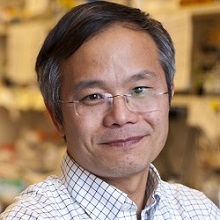The primary interest in our lab is to elucidate the regulation of protein structure after phosphorylation in health and disease. We discover a unique enzyme called Pin1 that controls protein conformation after specific protein modification called proline-directed phosphorylation, leading to the discovery of a unique post-phosphorylation signaling mechanism. We further demonstrate that Pin1 is highly regulated physiologically, and its deregulation has the pivotal but opposite impact on the development of cancer and Alzheimer’s disease, two major age-regulated diseases that were rarely studied together before, but are now accepted to be “two sides of the same coin”. Importantly, this new disease mechanism may lead to exciting novel diagnostic and therapeutic strategies. In cancer, Pin1 is abnormally activated to promote cancer and cancer stem cells by turning on and off dozens of oncogenes and tumor suppressors, respectively. Our mechanism-based HTS screens identify Pin1 inhibitors capable of simultaneously blocking multiple cancer-driving pathways in cancer and cancer stem cells, an attractive property for treating aggressive cancer. In Alzheimer’s disease, Pin1 is inhibited, but is needed to control the conformation of tau and APP, the two proteins thought to be key to disease pathology. To detect Pin1-catalyzed conformational regulation, we develop innovative peptide chemistries to generate antibodies able to distinguish cis from trans conformation of Pin1 substrates. This new generation of antibodies leads us to discover that cis P-tau is an early driver of neurodegeneration in Alzheimer’s and brain injury, which can be effectively blocked by cis antibody. We are further developing our Pin1 inhibitors and cis and trans antibodies to target Pin1 and Pin1-regulated conformational changes in cancer, brain injury and Alzheimer’s disease.

Kun Ping Lu, MD, PhD
Professor of Medicine, Beth Israel Deaconess Medical Center
Molecular Mechanisms and Treatment of Alzheimer’s, Neurotrauma and Cancer
